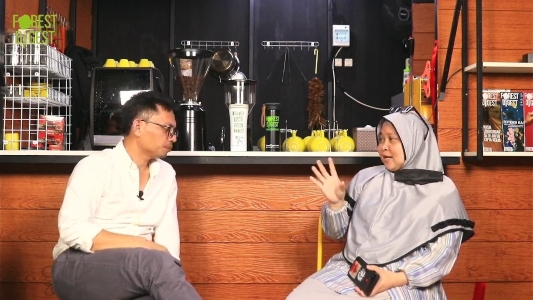Dr Eva Rahmawati: Ecotourism Market Opportunities are Very High After the Pandemic

Dr Eva Rachmawati, IPB University Lecturer from the Department of Conservation and Forest Resources and Ecotourism (KSHE), Faculty of Forestry and Environment (Fahutan) said that ecotourism has great potential as an alternative to post-pandemic tourism. Moreover, according to him, in the post-pandemic era, tourists certainly miss nature tourism activities.
"With the number of travelers increasing, the community can become a market opportunity to utilize the great potential of ecotourism resources so that it can prosper," he said in Ngobrol Menj Menjuka Berbuka (Ngolak) Forest Digest episode 3 with the theme 'Ecotourism Opportunities After Pandemic' (14/4).
She said that in order to get positive feedback, it is necessary to have clear planning and mitigation of the ecotourism area, depending on which market will be captured. Ecotourism planning can be based on the uniqueness of each region or thematically.
"Branding the uniqueness of ecotourism must be done more boldly. The uniqueness raised, for example, technology-based tourism, inclusive tourism for people with disabilities, medical tourism and so on," she said.
According to Dr Eva, opportunities from an economic perspective, especially after the pandemic, are very good. The willingness of visitors to pay for entrance tickets to conservation areas is quite high. Visitors dare to pay a high price because there is a goal to be achieved.
"The principle of implementation must be managed by the local community and is bottom up, so that the income earned can return to the community. Thus, the management is more sustainable," she continued.
In addition, the initiative and understanding of local communities regarding the preservation and utilization of conservation areas are needed. He suggested that the community must also be a good host to provide maximum service so that tourists want to come back to visit.
"Up-down management is not a problem as long as the government pays attention to policies and technicalities that are tailored to the social and environmental culture around the ecotourism area," she said.
Dr Eva said, students can also contribute to the management of this ecotourism through the ideas they come up with. The idea refers to market demand as well as the needs and peculiarities of each region.
"From these ideas, the community is also encouraged to increase their capabilities. Moreover, aspects of integration and collaboration are often an obstacle in managing ecotourism areas," she said.
She said that the younger generation can be one of the boosters of the ecotourism-based economy. This is evidenced by the increasing number of enthusiasts majoring in KSHE at IPB University every year.
"Students and graduates can take an important role in managing ecotourism with local communities so that the potential of ecotourism in Indonesia can be competitive," concluded Dr Eva. (MW/Rz) (IAAS/RUM)



